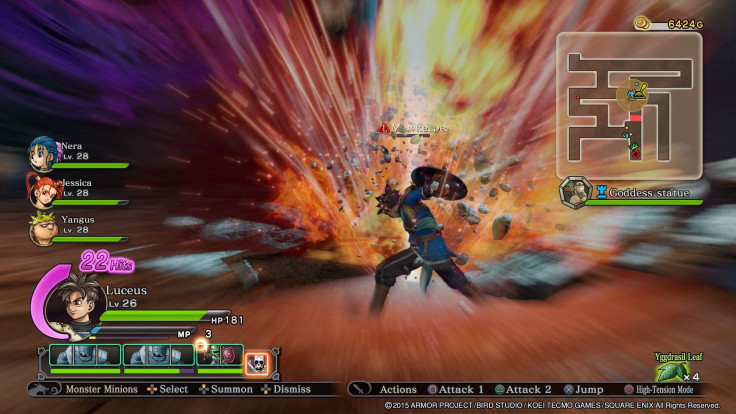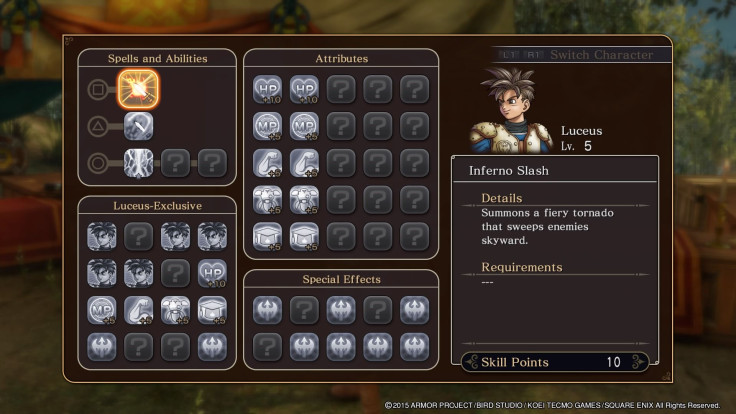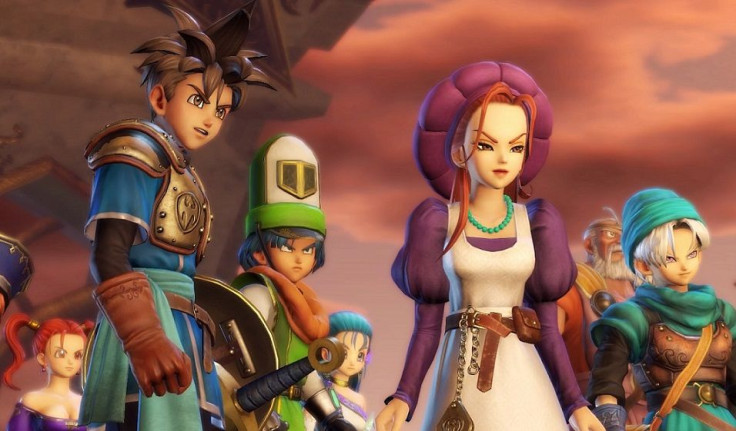Dragon Quest Heroes might go down as one of the year’s biggest surprises. As someone who’s been immensely critical of the hack-and-slash games over the years, primarily in discussion with close friends and peers, I expected Dragon Quest Heroes’ novelty to wear off quickly. The bright colors and character design by famed animator Akira Toriyama might be nice. But not so nice they’d cover up Dragon Quest Heroes’ mechanical shortcomings. And Musou games aren’t exactly known for evolving with the times.
For close to two decades, franchises like Dynasty Warriors and Samurai Warriors have been the go-to examples of the sub-genre, serving as warnings –for those of us off-put by highly repetitive gameplay – as much as ambassadors. But Dragon Quest Heroes: The World Tree's Woe and the Blight Below proves Omega Force, the Koei Tecmo subsidiary behind the Dynasty and Samurai Warriors franchises, is more than capable of creating an enjoyable hack-and-slash game. They just need the rights to someone else’s intellectual property to do it.
Dragon Quest Heroes picks up where right where Hyrule Warriors left off, in terms of composition. Like any Musou game, DQH asks players to use a combination of magic and steel to kill hundreds of enemies. Environments change frequently, players must occasionally guard an object or door and DQH features appearances from dozens of iconic Dragon Quest characters. But what sets Heroes apart from its many predecessors is a deeper incorporation of RPG elements than fans expect from Omega Force releases.
Unlike the various Warriors games, in which players control a single character, the vast majority of the Dragon Quest Heroes campaign gives players control of a four-member party. Every hero who joins the party fits into a familiar RPG archetype, like tank or spellcaster, with skill trees that give players some tactical flexibility. The game isn’t turn-based, so you can’t fully micro-manage an engagement; however, swapping characters only requires the press of a button. And there are times when players must use the unique abilities of each party member to emerge from combat victorious.
Combat is a bit more complex than we’ve come to expect from Omega Force. There are still only two attack buttons for standard and magical attacks, along with dodge and block commands. A trigger-activated skill/spell-casting system gives players access to each hero’s unique abilities. In a first for Omega Force, Dragon Quest Heroes also implements a basic threat/aggro system that can have a big impact on the outcome of some missions. And you might be surprised by how frequently turrets are made available to players during the Dragon Quest Heroes campaign.

Once the campaign gets rolling, Dragon Quest Heroes proves to be surprisingly story-focused. DQH is still a podcast game when players are out on the battlefield. But you’ll probably want to hit pause your chosen soundtrack for cutscenes and pre/post-fight conversations. Omega Force came up with a pretty great reason for incorporating so many different segments of the Dragon Quest franchise into Heroes and the narrative beats anything we’ve seen in 18 years of Warriors games. Following the plot isn’t necessary but a good story is one of the biggest differentiators between DQH and other Musou games.
As for action, Dragon Quest Heroes offers pretty much exactly what you’d expect. Players travel from one location to the next, slaughtering hundreds of familiar enemies from the year history of the Dragon Quest franchise. Every few levels, DQH throws a boss encounter at your. Its pretty boiler plate, for the hack-and-slash genre, but the visual style of the Dragon Quest franchise makes DQH easier to stick with for extended gaming sessions. Each battlefield features vibrant colors, from bright green foliage seen throughout Dragon Quest Heroes to baby-blue sky seen in most outdoor environments. It’s a welcome change from the two series that made Omega Force famous, both of which I’ve always found to be some of the least visually-interesting games to hit the market.
Unlike previous Musou games, many of which feature lengthy encounters between rival armies, most stages in Dragon Quest Heroes can be completed in 15-20 minutes. Players spawn into a given arena, take down a few waves of baddies, collect their loot and move on. In between stages, players return to the party’s base of operations, where they can buy new equipment, sell treasure they recovered, craft new accessories, assign skill points, accept new side quests, etc.
Players can revisit the various battlefields seen during the Dragon Quest Heroes campaign. But, rather than repeat the same mission over and over, DQH lets players choose a difficulty setting and then mop-up endless waves of enemies from the selected stage. It’s a great way to earn some extra experience for under-leveled party members, gold for new equipment and/or grind for the items needed to build a new accessory a party member. Recoverable maps also let players take on increasingly difficult versions of the bosses from the Dragon Quest Heroes.
And if all that doesn’t seem like enough content, the North American version of Dragon Quest Heroes features all of the post-launch DLC already released in Japan. Together, the Dragon Quest Heroes DLC adds five more scenarios to the game, several of which feature their own unique boss battles.

The project isn’t without its shortcomings, though. Dragon Quest Heroes improves many aspects of the typical Musou gaming experience but the game isn’t above getting in its own way. As we mentioned, most of the stages in Dragon Quest Heroes are relatively short and being sent back to your party’s base of operations after each encounter gets tedious as the game progresses. Rather than make players go through the entire process of returning to base, calling up the world map, finding the next story mission and then waiting for it to load, it would’ve been nice to see a post-mission prompt asking whether you’d like to return to base or continue with the DQH campaign.
The progression mechanics in Dragon Quest Heroes don’t feel as meaningful as we’d like. Skill trees for each character are a nice touch, and give players a bit of flexibility, but they aren’t as diverse as we’d like. There are several inexplicable difficulty spikes, without any sort of warning, which can be frustrating if you prefer mindless violence in your hack-and-slash games. One encounter, many hours into the Dragon Quest Heroes campaign, feels like a tribute to the rage-inducing bosses a player might find in Dark Souls. You even have to rely on an Estus flask surrogate to survive.
Some will also be off-put by the amount of grinding necessary to keep their favorite character(s) on-par with the rest of the party. We suspect Dragon Quest Heroes introduces increasingly powerful heroes to the party as a way of encouraging players to try out everyone. And, as someone entirely unfamiliar with the Dragon Quest franchise, I can’t say I minded all that much. But it’s not hard to imagine a longtime fan being frustrated when they find out they’ll have to spend a few hours grinding for the first members of your party to match experience with the last heroes to join the group.
And a predilection for brighter colors doesn’t completely save Dragon Quest Heroes from the same problem we find in every Musou game: a lack of enemy variety. Blue slimes and green imps might be more fun to look at, than the lifeless and flatly-colored enemies found in similar titles, but Koei Tecmo should’ve tapped a few more creatures from the Dragon Quest franchise. The game does an admirable job of swapping its bestiary in/out of rotation, to alleviate the problem. But it’s still an issue.

Dragon Quest Heroes feels like the video game equivalent of a Saturday morning cartoon. Players aren’t going to walk away from it having learned any major life lessons. We suspect many gamers won’t even remember much more than the game’s biggest plot points within a few days of completing the Dragon Quest Heroes campaign.
But playing Dragon Quest Heroes is a great way to kill some time on the weekend or after a long day at the office. It also makes an excellent companion for your next Netflix or podcast marathon. I’ve even played DQH a few times, using Remote Play on my Vita, while watching football on Sunday afternoons. The controls don’t map quite as well as I’d like, especially when compared to the top-tier Remote Play titles like Destiny or Wolfenstein: The New Order, but (in most cases) it’s enough to get the job done.
Those who loathe Musou games are unlikely to be swayed by Dragon Quest Heroes. No matter how different the game feels, thanks to its RPG elements and story, DQH inherits too much of its gameplay from Dynasty Warriors to ignore. But Dragon Quest Heroes is perfect for anyone who’s been waiting for Omega Force to improve upon the gameplay formula they’ve leaned on for the last 18 years. Dragon Quest Heroes may have its flaws. But the game proves, once again, Omega Force’s third-party projects remain Must Play games for any longtime fans of the hack-and-slash genre.
Score – 4/5
Full Disclosure: The PS4 copy of Dragon Quest Heroes used in the creation of this review was provided by a representative of Square Enix; however, the publisher did not retain any editorial oversight/privileges.


















